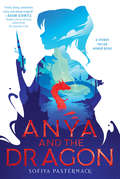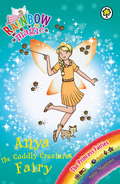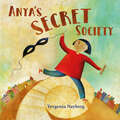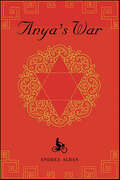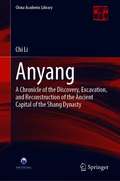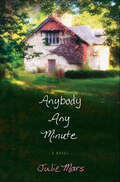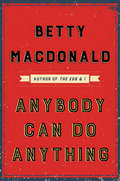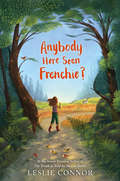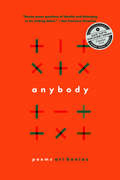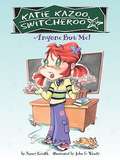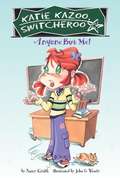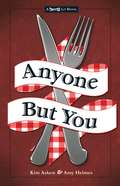- Table View
- List View
Anya and the Dragon (Anya And The Dragon Ser. #1)
by Sofiya PasternackThis lush tale of magic and dragons is a gem for any adventure-seeking middle grader and perfect for fans of Aru Shah and the End of Time.Anya and the Dragon is the story of fantasy and mayhem in tenth century Eastern Europe, where headstrong eleven-year-old Anya is a daughter of the only Jewish family in her village. When her family’s livelihood is threatened by a bigoted magistrate, Anya is lured in by a friendly family of fools, who promise her money in exchange for helping them capture the last dragon in Kievan Rus. This seems easy enough, until she finds out that the scary old dragon isn’t as old—or as scary—as everyone thought. Now Anya is faced with a choice: save the dragon, or save her family.
Anya and the Nightingale
by Sofiya PasternackThe adventure continues in this exciting sequel to Anya and the Dragon; a dangerous monster lurks beneath the city and only Anya can keep him from taking her friends&’ magic—and their lives. Perfect for fans of The Girl Who Drank the Moon. It&’s been a year since a violent Viking terrorized the small village of Zmeyreka and Anya and her foolish friend Ivan saved a friendly dragon from being sacrificed for his magic. But things still aren&’t safe in the kingdom of Kievan Rus&’. After embarking on a journey to bring her papa home from war, Anya discovers a powerful forest creature terrorizing travelers. But she soon learns that he&’s not the monster the kingdom should fear. There&’s an even greater evil that lurks under the city. Can Anya stop the monster, save her papa, and find her way home? Or will the secrets of Kiev leave Anya and her friends trapped beneath the city forever?
Anya the Cuddly Creatures Fairy: The Princess Fairies Book 3 (Rainbow Magic #3)
by Daisy MeadowsGet ready for an exciting fairy adventure with the no. 1 bestselling series for girls aged 5 and up. Rachel and Kirsty have been invited to meet the seven nieces of King Oberon and Queen Titania - the Princess Fairies! But when Kirsty and Rachel arrive in Fairyland things soon go wrong, Jack Frost and his wicked goblins steal the princesses' tiaras! The tiaras contain special fairy magic that look after happiness and fun in both the human and fairy worlds. They need to get them back so everyone can be happy once again! 'These stories are magic; they turn children into readers!' ReadingZone.com Read all seven fairy adventures in the Princess Fairies set! Honor the Happy Days Fairy; Demi the Dressing-up Fairy; Anya the Cuddly Creatures Fairy; Elisa the Adventure Fairy; Lizzie the Sweet Treats Fairy; Maddie the Playtime Fairy; Eva the Enchanted Ball Fairy. If you like Rainbow Magic, check out Daisy Meadows' other series: Magic Animal Friends and Unicorn Magic!
Anya's Secret Society
by Yevgenia NaybergLeft-handed Anya draws with great passion . . . but only when she's alone.In Russia, right-handedness is demanded--it is the right way. This cultural expectation stifles young Anya's creativity and artistic spirit as she draws the world around her in secret.Hiding away from family, teachers, and neighbors, Anya imagines a secret society of famous left-handed artists drawing alongside her. But once her family emigrates from Russia to America, her life becomes less clandestine, and she no longer feels she needs to conceal a piece of her identity.
Anya's War
by Andrea AlbanAnya Rosen and her family have left their home in Odessa for Shanghai, believing that China will be a safe haven from Hitler's forces. At first, Anya's life in the Jewish Quarter of Shanghai is privileged and relatively carefree: she has crushes on boys, fights with her mother, and longs to defy expectations just like her hero, Amelia Earhart. Then Anya finds a baby—a newborn abandoned on the street. Amelia Earhart goes missing. And it becomes dangerously clear that no place is safe—not for Jewish families like the Rosens, not for Shanghai's poor, not for adventurous women pilots.Based on a true story, here is a rich, transcendent novel about a little-known time in Holocaust history.
Anya: A Novel
by Susan Fromberg SchaefferAnya Savikin lived among well-to-do Russian Jews in Poland, in a world more like Tolstoy's than our own, until the first bombing of Warsaw and the chaos that ensued. Her story incarnates the strength and love of eastern European Jewry, before and after their decimation. Reading group guide included.
Anyang: A Chronicle of the Discovery, Excavation, and Reconstruction of the Ancient Capital of the Shang Dynasty (China Academic Library)
by Chi LiThis book presents an anthology of English-language archaeological and anthropological writings by Li Chi, the founding father of modern archaeology in China. It is divided into 15 chapters; in the first two, Dr. Li sets the stage by introducing the principal characters involved in the first “act” of this modern archaeological drama; in the third and fourth chapters, he describes the status of Chinese archaeology during the early years of the twentieth century and highlights the contributions of prominent foreigners. Starting with the fifth chapter, Dr. Li begins detailing the excavations and describes the principle finds of the Anyang expedition. In turn, the book’s closing chapters present a summary of the findings and descriptions of some of the major publications that this monumental project has yielded. For readers who are interested in Chinese civilization, what will appeal to them most are the details of the excavations of Yin Hsü (the ruins of the Yin Dynasty), including building foundations, bronzes, chariots, pottery, stone and jade, and thousands of oracle bones, which are vividly shown in historical pictures. These findings transformed the Yin Shang culture from legend into history and thus moved China’s history forward by hundreds of years, shocking the world. The anthology also includes Li Chi’s reflections on central problems in Chinese anthropology, which are both enlightening and thought-provoking.
Anybody Any Minute: A Novel
by Julie MarsEllen Kenny has a big mouth and a penchant for telling the truth, which is why she's just been fired from yet another high-profile NYC job. Determined to make the most of this unexpected free time, she heads to Montreal to visit her sister. On the way, she spots a tumbledown upstate farmhouse---one she's seen in her dreams for years---and impulsively buys it on a hefty credit card advance. Over her husband's protests, Ellen decides to drop out of the rat race and spend the summer living out her woman-who-runs-with-the wolves fantasy, communing with nature---her own included---in an effort to confront middle age and figure out how on earth she got there. Rather than peacefully tend her garden and puzzle things out, however, Ellen soon becomes embroiled in the exceedingly unique problems of two redneck, social misfit neighbors---an ex-biker and an aging chainsaw sculptor---while taking care of a narcoleptic dog and a child who doesn't speak English. With Ellen's quest for meaning and her concern for the welfare of others driving the plot, Anybody Any Minute is deeply layered, heartbreaking . . . and hilarious.
Anybody Can Do Anything
by Betty MacDonaldThe author of The Egg and I continues her hilariously candid memoir series as she enters the job market at the worst possible time—the Great Depression.“The best thing about the Depression was the way it reunited our family and gave my sister Mary a real opportunity to prove that anybody can do anything, especially Betty.” So begins Betty MacDonald’s singular chronicle of trying to make ends meet amid the worst economic downturn in American history.After surviving both the failed chicken farm - and marriage - immortalized in The Egg and I, Betty MacDonald returns to live with her mother and desperately searches to find a job to support her two young daughters. With the help of her older sister Mary, Anybody Can Do Anything recounts her failed, and often hilarious, attempts to find work during the Great Depression.
Anybody Can Do Anything
by Betty Macdonald"THE BEST THING about the depression was the way it reunited our family and gave my sister Mary a real opportunity to prove that anybody can do anything, especially Betty." After divorcing her first husband, Betty returns home with her two children. With humor, she tells of her many jobs, including the one where she picked up TB from a boss. (See "The Plague and I," also available from Bookshare.) She relates her daughter's escopades as they grow into teenagers, paints a picture of what it was like for some families to live through the depression.
Anybody Here Seen Frenchie?
by Leslie ConnorA big-hearted, beautiful, and funny novel told from multiple viewpoints about neurodiversity, friendship, and community from the award-winning author of The Truth as Told by Mason Buttle, Leslie Connor.Eleven-year-old Aurora Petrequin’s best friend has never spoken a word to her. In fact, Frenchie Livernois doesn’t talk.Aurora is bouncy, loud and impulsive—“a big old blurter.” Making friends has never come easily. When Frenchie, who is autistic, silently chose Aurora as his person back in third grade, she chose him back. They make a good team, sharing their love of the natural world in coastal Maine.In the woods, Aurora and Frenchie encounter a piebald deer, a rare creature with a coat like a patchwork quilt. Whenever it appears, Aurora feels compelled to follow.At school, Aurora looks out for Frenchie, who has been her classmate until this year. One morning, Frenchie doesn’t make it to his classroom. Aurora feels she’s to blame. The entire town begins to search, and everyone wonders: how is it possible that nobody has seen Frenchie? At the heart of this story is the friendship between hyper-talkative Aurora and nonvocal Frenchie. Conflict arises when Aurora is better able to expand her social abilities and finds new friends. When Frenchie goes missing, Aurora must figure out how to use her voice to help find him, and lift him up when he is found.Featuring a compelling mystery and a memorable voice, this is a natural next-read after Leslie Connor’s The Truth as Told by Mason Buttle.* Kids’ Indie Next Pick *“Leslie Connor brilliantly depicts a genuine and meaningful friendship between a dynamic girl and her nonvocal friend. By showing the ways Aurora and Frenchie communicate, Connor gives us a blueprint for seeing autistic children in a new light. I loved, loved, loved this book!” —Cammie McGovern, author of Frankie and Amelia and Chester and Gus
Anybody Out There?
by Marian KeyesBestselling author Marian Keyes has delighted readers with the lives, loves, and foibles of the irrepressible Walsh sisters and their eccentric mammy. In this Life in the Big Apple is perfect for Anna. She has the best job in the world, a lovely apartment, and great friends. Then one morning, she wakes up in her mammy's house in Dublin with stitches in her face, a dislocated knee, hands smashed up, and no memory at all of what happened. As soon as she's able, Anna's flying back to Manhattan, mystified but determined to find out how her life turned upside down. As her past slowly begins coming back to her, she sets out on an outrageous quest--involving lilies, psychics, mediums, and anyone who can point her in the right direction. Marrying life's darker bits with wild humor and tender wit, Anybody Out There? is a strange and wonderfully charming look at love here and ever after.
Anybody Out There?
by Marian KeyesBestselling author Marian Keyes has delighted readers with the lives, loves, and foibles of the irrepressible Walsh sisters and their eccentric mammy. In this Life in the Big Apple is perfect for Anna. She has the best job in the world, a lovely apartment, and great friends. Then one morning, she wakes up in her mammy's house in Dublin with stitches in her face, a dislocated knee, hands smashed up, and no memory at all of what happened. As soon as she's able, Anna's flying back to Manhattan, mystified but determined to find out how her life turned upside down. As her past slowly begins coming back to her, she sets out on an outrageous quest--involving lilies, psychics, mediums, and anyone who can point her in the right direction. Marrying life's darker bits with wild humor and tender wit, Anybody Out There? is a strange and wonderfully charming look at love here and ever after.
Anybody Shining
by Frances O'Roark DowellCan one mistake destroy the chance of a lifetime? A girl discovers there are many ways of being true in this magnificent ode to handwritten letters and the shining power of friendship from the author of Dovey Coe, set in the Appalachian mountains of 1920s North Carolina.One true friend. Someone shining. That’s all twelve-year-old Arie Mae wants. But shining true friends are hard to come by deep in the mountains of western North Carolina, so she sets her sights on a cousin unseen, someone who lives all the way away in the big city of Raleigh, North Carolina. Three unanswered letters later, Arie Mae learns that a group of kids from Baltimore are coming to spend a summer on the mountain. Arie Mae loves her smudge of a town—she knows there’s nothing finer than Pa’s fiddling and Mama’s apple cake, but she also knows Big City folk might feel differently. How else to explain the song catcher ladies who have descended upon the village in search of “traditional tunes” and their intention to help “save” the townspeople? But when the group from Baltimore arrives, it seems there just might be a gem among them, one shining boy who doesn’t seem to notice Arie Mae wears the same dress every day and prefers to go barefoot. So what if he has a bit of a limp and a rumored heart problem—he also is keen about everything Arie Mae is keen about, and has all the makings of a true friend. And so what if the boy’s mother warns him not to exert himself? He and Arie Mae have adventures to go on! In between writing letters to her cousin, Arie Mae leads her one shining friend on ghost hunts and bear chases. But it turns out those warnings were for a reason… “Arie Mae’s openheartedness and yearning for connection make for a deeply poignant story, one with a richly realized setting and cast. As Arie Mae begins to see her life in a new light, Dowell (The Second Life of Abigail Walker) examines the clash between city and country life and what true wealth really means” (Publishers Weekly, starred review).
Anybody at Home?
by H. A. ReyThe short verses in Anybody at Home? ask children to identify various homes and the animals and objects that live there
Anybody's Business
by Barbara Van Syckle Brian TietjeMore than a book, Anybody's Business is an approach to business and life that harnesses the best of people and how they work together to produce a transformation in perspective and purpose. This text shows the students the connections between business concepts and their everyday lives. The skills they learn can be put to use from the moment they leave the classroom and throughout their professional journey.
Anybody's Guide To Total Fitness
by Leonard KravitzAnybody’s Guide to Total Fitness, eleventh edition, by Len Kravitz combines the most up-to-date scientific and practical information for establishing an optimal health, fitness and wellness lifestyle. The text offers instruction on how to customize exercise programs for high intensity interval training, indoor cycling, aerobic kickboxing, circuit training, biomotor functional exercise conditioning, boot camp training, barefoot running and aquatic workouts. The book comes with a behavioral modification planner and assessment supplement that promotes positive, self-directed goal attainment.
Anybody's Guide to Total Fitness Student Profile Guide
by Len KravitzAnybody’s Guide to Total Fitness Student Profile Guide(11th Edition) by Len Kravitz
Anybody: Poems
by Ari Banias"Ari Banias is one of the best living poets, and this book in your hands is our proof. Anybody is the courage of a poet who trusts the strength of poetry to make room in our world for everybody." --CAConrad In Anybody, Ari Banias takes up questions of recognition and belonging: how boundaries are drawn and managed, the ways he and she, us and them, here and elsewhere are kept separate, and at what cost identities and selves are forged. Moving through iconic and imagined landscapes, Anybody confronts the strangeness of being alive and of being a restlessly gendered, queer, emotive body. Wherever the poet turns--the cruising spaces of Fire Island, a city lake, a Greek island, a bodega-turned-coffee-shop--he finds the charge of boundedness and signification, the implications of what it means to be a this instead of a that. Witty, tender, and original, these poems pierce the constructs that define our lives.
Anybody’s Bike Book
by Jon ScovilleThis is a book about fixing bicycles. It is written in such a way that anyone can use it to fix any bicycle. Many of you (especially the ladies) have been given the idea that if something is mechanical, you can't do it. That is outrageous. Bicycles are not monstrous machines which only wizards can understand. They are all simple enough that with a little know-how and patience, anyone can work on them. You can do it! You don't have to know any magic. The mechanical mystique is a lie.
Anyone
by Nate KlugMilton’s God Where I-95 meets The Pike, a ponderous thunderhead flowered-- stewed a minute, then flipped like a flash card, tattered edges crinkling in, linings so dark with excessive bright that, standing, waiting, at the overpass edge, the onlooker couldn’t decide until the end, or even then, what was revealed and what had been hidden. Using a variety of forms and achieving a range of musical effects, Nate Klug’s Anyone traces the unraveling of astonishment upon small scenes--natural and domestic, political and religious--across America’s East and Midwest. The book’s title foregrounds the anonymity it seeks through several means: first, through close observation (a concrete saw, a goshawk, a bicyclist); and, second, via translation (satires from Horace and Catullus, and excerpts from Virgil’s Aeneid). Uniquely among contemporary poetry volumes, Anyone demonstrates fluency in the paradoxes of a religious existence: "To stand sometime / outside my faith . . . or keep waiting / to be claimed in it. ” Engaged with theology and the classics but never abstruse, all the while the poems remain grounded in the phenomenal, physical world of "what it is to feel: / moods, half moods, / swarming, then darting loose. ”
Anyone But Me #1
by Nancy E. KrulikKatie Carew, nicknamed Katie Kazoo by the class bully, had no idea what would happen when she wished that she could be anyone but herself. But now her wish has come true, and-switcheroo!-she keeps turning into other people and even animals! What is one ordinary third-grade girl with a really extraordinary problem to do? It's a good thing Katie is resourceful and smart enough to find a solution for every problem . . . no matter how much of a disaster she causes! Katie can't stand George, the class bully. He constantly picks on everyone, but he really torments Katie. One day, she can't stand it anymore, and she wishes she could be anyone but herself. What she doesn't see is the shooting star that flashes through the sky at that moment . . . catapulting Katie into a crazy series of adventures, starting the next day when she turns into the class hamster! Will she be trapped in a glass cage forever? Will she ever be a girl again? .
Anyone But Me (Katie Kazoo Switcheroo #1)
by Nancy KrulikKatie Carew is fed up. Everything keeps going wrong. If only she could be anyone but herself! But Katie has to be careful what she wishes for...it just might come true! In this story, Katie turns into a hamster. Very cute. She has problems with a classroom bully and the way this problem is resolved is great. Fun facts about hamsters can be found at the end of the book.
Anyone But You
by Amy Helmes Kim AskewThese violent delights have violent ends... Gigi Caputo is fed up. A vicious act of vandalism has dealt another blow to her family's proud pizza heritage, and the Montes--owners of a rival Italian restaurant--are clearly to blame. The hostility goes far beyond bragging rights for best pizza in Chicago. The Montes have been bent on destroying Cap's for four generations. Even if it means putting herself in harm's way, Gigi's determined to get to the bottom of the feud. Instead, in a secret encounter with Roman Monte, the very boy whose relatives have brought her family such grief, she finds both danger and love at first sight. If the daughter and son of these two warring families fall for each other, can it be anything but a recipe for disaster? Slowly, Gigi and Roman learn that their story is fatefully linked to the summer of 1933, when two twelve-year-olds, Benny and Nick, hop the turnstile at the Chicago World's Fair. The most stunning wonder of the fair is Stella, who innocently causes a lasting rift between the two boyhood. Wending its way through past and present day, this modern take on Shakespeare's Romeo and Juliet is bittersweet, funny, and intensely exciting. It's classic romance--a tale of hate and the only force that can ever defeat it: love.
Anyone But You
by Jennifer CrusiePart basset, part beagle, all Cupid...For Nina Askew, turning forty means freedom--from the ex-husband, freedom from their stuffy suburban home, freedom to focus on what she wants for a change. And what she wants is something her ex always vetoed--a puppy. A bouncy, adorable puppy.Instead she gets...Fred.Overweight, middle-aged, a bit smelly and obviously depressed, Fred is light-years from perky. But he does manage to put Nina in the path of Alex Moore, her gorgeous, younger-by-a-decade neighbor.Alex seems perfect--he's a sexy, seemingly sane, surprisingly single E.R. doctor--but the age gap convinces Nina that anyone but Alex would be better relationship material. But with every silver-haired stiff she dates, the more she suspects it's the young, dog-loving doc she wants to sit and stay!
